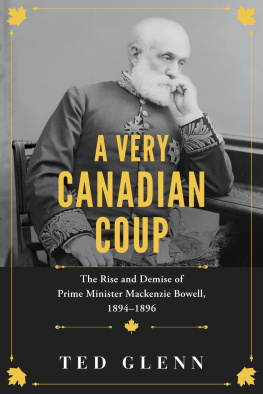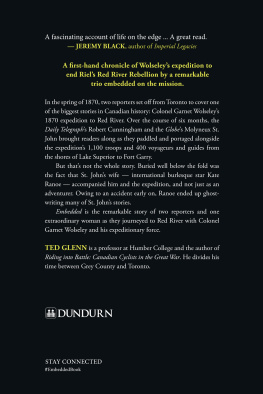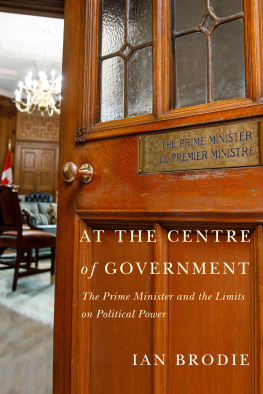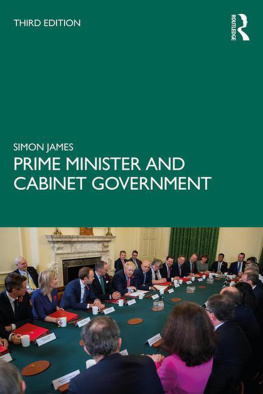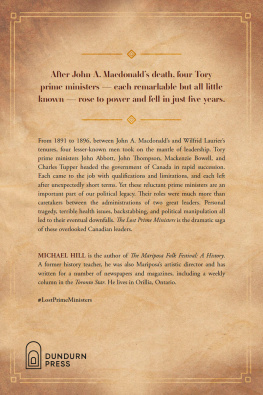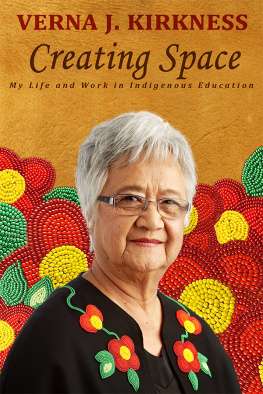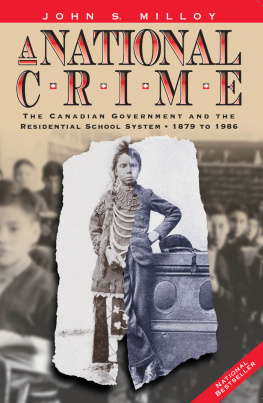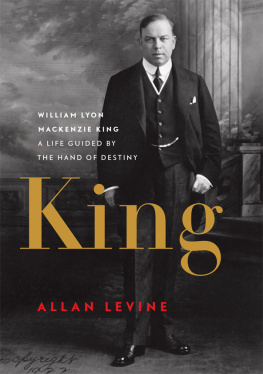
Black and white photo of then Prime Minister Mackenzie Bowell, in full regalia, and looking pensive.
About the Author

Ted Glenn is an author, educator, and cyclist who divides his time between the bicycle paths of Toronto and the rolling hills of Grey County, Ontario. For the past twenty years, hes managed the graduate program in public administration at Humber College and written about Canadian legislatures, professional communications, and statecraft. Ted spends much of his spare time writing about forgotten interstices in Canadian history. This work includes Riding into Battle: Canadian Cyclists in the Great War (Dundurn, 2018), Lawrence of Canada: How the Legend of the Dashing British First World War Hero Went Through a Test Run in Toronto (Canadian History, December 2020), and Embedded: Two Journalists, a Burlesque Star, and the Expedition to Oust Louis Riel (Dundurn, 2020).
Cast
ABERDEEN, LADY ISHBEL MARJORIBANKS (18571939). Wife of Governor General Lord Aberdeen, president of the International Council of Women, and founder and organizer of the National Council of Women of Canada. Her Canadian Journal, 18931898 is one of the most important primary documents for Canadian politics of the 1890s, providing particular insight into the life and times of Canadas Sixth Ministry.
ABERDEEN, LORD JOHN HAMILTON GORDON (18471934). Aberdeen served briefly as Lord Lieutenant of Ireland in 1886, prior to his appointment as Canadian Governor General in 1893. He was served by four Canadian prime ministers Thompson, Bowell, Tupper, and Laurier. He and his wife, Ishbel, purchased Coldstream Ranch in British Columbias Okanagan Valley in 1891 and oversaw the development of one of the regions first commercial orchard operations.
ANGERS, AUGUSTE-RAL (18371919). After six tumultuous years in provincial politics, Angers was appointed to the Quebec Superior Court in 1880 where he served until his return to politics as Lieutenant Governor of Quebec in 1887. At the height of the Mercier affair in 1891, Angers unceremoniously dismissed the Quebec premier, strengthening his reputation for decisiveness and action. In December 1892, Prime Minister Thompson appointed Angers to the Senate and made him minister of agriculture. Angers resigned from the Dominion cabinet in July 1895 to protest Bowells decision to delay introduction of remedial legislation.
CARON, ADOLPHE (18431908). A graduate of McGill law (where he studied under John Abbott), the always-debonaire Caron was first elected to the House of Commons in 1873 and represented three different Quebec ridings until 1900. An able organizer, Caron was appointed minister of militia and defence in 1880 and in that capacity led the Canadian governments efforts to put down the Northwest Rebellion in 1885. Caron was moved to postmaster general under Abbott, a position he retained until Tupper became prime minister in May 1896. Caron, along with fellow Quebec minister Ouimet, briefly resigned from cabinet in July 1895 to protest Bowells proposed delay in introducing remedial legislation.
CLARKE WALLACE, NATHANIEL (18441901). Long-time member for York West, Clarke Wallace was also grand master of the Loyal Orange Association of British North America and president of the Triennial Council of the Orangemen of the World. Appointed to cabinet by Prime Minister Thompson in December 1892, Clarke Wallace was seen as Bowells successor as unofficial Orange representative in the Dominion cabinet. He resigned his post in December 1895 to protest Bowells plans to proceed with remedial legislation in the upcoming legislative session.
COOK, FRED (18581943). Journalist and parliamentary correspondent with the Montreal Star, Toronto Empire, Toronto Mail, Mail and Empire, Globe, Globe and Mail, and London Times before a long career in municipal politics, including two terms as mayor of Ottawa.
DALY, THOMAS (18521911). A two-term mayor of Brandon, Daly was elected to the House of Commons in 1887 for Selkirk and promoted to minister of the interior in 1892, the first westerner appointed to cabinet. Daly travelled with Bowell during his 1895 trip across British Columbia, the Northwest Territories, and Manitoba.
DICKEY, ARTHUR (18541900). In 1888, Dickey succeeded Sir Charles Tupper as member for Cumberland in the House of Commons. He was appointed secretary of state in Bowells Sixth Ministry, with subsequent promotions to the militia and defense and justice portfolios under Bowell and then attorney general in Tuppers Seventh Ministry. In the fall of 1895, Dickey encouraged Tupper Sr. to return to Canada and seek the prime ministership. He was one of the seven bolters who forced Bowell to resign and make way for Tupper in 1896.
DRUMMOND, GEORGE (18291910). A successful businessman and Conservative booster from Montreal, Drummond was summoned to the Senate by Prime Minister Macdonald in 1888. With Donald Smith, Drummond helped convince Charlie Tupper to rescind his resignation from cabinet in March 1895.
EWART, JOHN (18521933). The Winnipeg-based lawyer represented Manitobas Roman Catholic minority in a series of cases concerning the Manitoba schools question and in negotiations with the Dominion government over the content of Bill C-58, the Bowell administrations proposed remedial legislation.
FOSTER, GEORGE (18471931). First elected to the House of Commons in 1882, Foster was promoted to minister of marine and fisheries in 1885 and then to finance in 1888 a position he held through the Abbott, Thompson, Bowell, and Tupper administrations. A strong temperance advocate, Fosters leadership ambitions were derailed by his marriage to a divorcee, an inexcusable indiscretion in conservative 1890s Ottawa. Foster was one of seven bolters who forced Bowell to resign in 1896 and make way for Sir Charles Tupper to assume the premiership.
GREENWAY, THOMAS (18381908). Greenway was a three-term Manitoba premier (1888 to 1900). He and his government are perhaps best remembered for the legislation introduced in 1890 to abolish Manitobas separate school system.
HAGGART, JOHN (18361913). One of the longest-serving members of the House of Commons, Haggart was first elected in 1872 for Perth and promoted to cabinet in 1888. Prime Minister Abbott promoted Haggart to minister of railways and canals and made him senior cabinet minister responsible for Ontario in 1892. Haggarts leadership ambitions were thwarted by numerous scandals, including the Canadian Pacific Schedule B contract scandal in British Columbia, the Tay Canal scandal in Perth, and the scandal involving an overpaid typist in the department of postmaster general, Miss Jane Craig. Haggart was one of the seven bolters who forced Bowell to resign and make way for Sir Charles Tupper to succeed him in 1896.
IVES, WILLIAM (18411899). A successful, albeit controversial, businessman from the Eastern Townships, Ives was elected to the House of Commons in 1878. He was promoted to cabinet as one of two English-language representatives from Quebec in December 1892, a position formerly held by his father-in-law, John Henry Pope. Ives was one of the seven bolters who forced Bowell to resign in 1896 to make way for Sir Charles Tupper.
LAURIER, WILFRID (18411919). The longest-serving member of the House of Commons and Canadas first French Canadian prime minister, Laurier led a spirited opposition to Bill C-58, the Bowell administrations proposed remedial legislation, in the winter and early spring of 189596. Laurier and his Liberals defeated Prime Minister Tupper and his Conservatives in the June 1896 general election, ending nearly eighteen years of Conservative rule.

